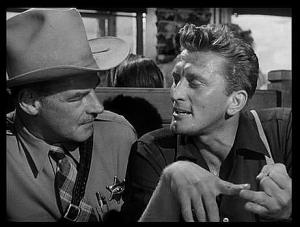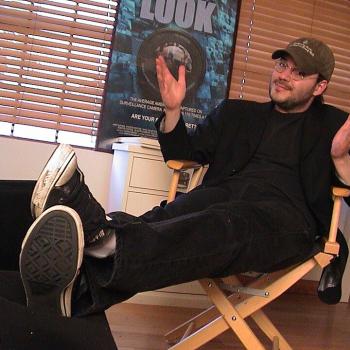
Source: Flickr user Greg Bishop
License
Billy Wilder’s Ace in the Hole (1951) effects a miracle. Its protagonist, Charles Tatum (Kirk Douglas), is a low-down scoundrel, a reporter (but I repeat myself) fired from eleven positions across nearly every American market. His crimes run the gamut from boozing to adultery, though what’s never gotten him fired is his eye for scandal and his talent for embellishment. Now, he finds himself him Albuquerque, working for a newsman whose office is plastered with signs that remind reporters: “TELL THE TRUTH.” Tatum is loathsome, venal, an all-American man. His actions in the film befit Stalin’s line about one man’s death being a tragedy, millions a statistic. I don’t know if no man is good but the Father. What I do know is that Charles Tatum is not a good man. And yet, he is funny. Wilder’s movie is hilarious—grim but enchanting.
Tatum spends a year slaving away at this desert-town paper, looking for his big break, which comes by chance one day when, on the way to cover a rattlesnake hunt, he stops off for gas only to find the proprietors’ son trapped after a nearby cave-in. Even better: the man, Leo Minosa (Richard Benedict), went spelunking to find Native American artifacts. The whole cave system is an Indian burial ground. He’s got a story greater than he could’ve imagined and allies with a corrupt local sheriff and a panoply of smalltime powerbrokers to ensure that the situation isn’t resolved quickly and that only he has the right to cover it. Soon, rubberneckers litter the sandy landscape. Tents seem to sprout from the barren soil, followed not long after by carnival sideshows, rides, and hotdog stands. Leo, choking on stone dust, misses his wife, Lorraine (Jan Sterling), who hates him and welcomes the glut of business to this out of the way place. Now she can at least escape with some money to her name.
At the time, audiences and critics hated the film, casting the project as cynical vituperation, an attack on journalism as a pillar of American democracy (this was 1951 after all). The events, however, had their bases. One such precursor is even mentioned in Wilder’s movie: Floyd Collins, a cave explorer whose death before a rescue team reached him earned reporter William Burke “Skeets” Miller a Pulitzer for his coverage of the (ahem) media circus. Wilder builds this dismissive criticism straight into the DNA of his film. Ace in the Hole is only cynical (and this is always the implication) if its bleakness makes matters seem worse than they are.
That’s what keeps me coming back to this movie: Wilder’s willingness to foreground a reprehensible newsman surrounded by largely irredeemable conmen, paragons of a free market in our attention, attention we as a public gladly fork over. The movie’s good characters get short shrift and end up with nothing but suffering and the sweet release of death, their wages for holding onto hope and faith. Tatum’s late turn to shame and redemption satisfies the demands of 50s propriety more than it does any intrinsic artistic direction. These are hollow, malicious people whose gross greed and self-import hide underneath ten-cent words and feigned concern (Lorraine’s line refusing to attend a prayer service for her husband because kneeling “bags my nylons” comes to mind). Wilder had no problem showing us bad people doing bad things for bad people wanting bad things.
Even we the audience don’t come away unscathed, rubberneckers to virtual tragedy that we are. Wilder’s film makes us think even as it entertains. How banal that sounds. Thought here, however, is self-accusation channeled through wry irony and the funhouse mirror of so-called cynicism. And that kind of ruminating, well, I’d dare say we could use more of it.













